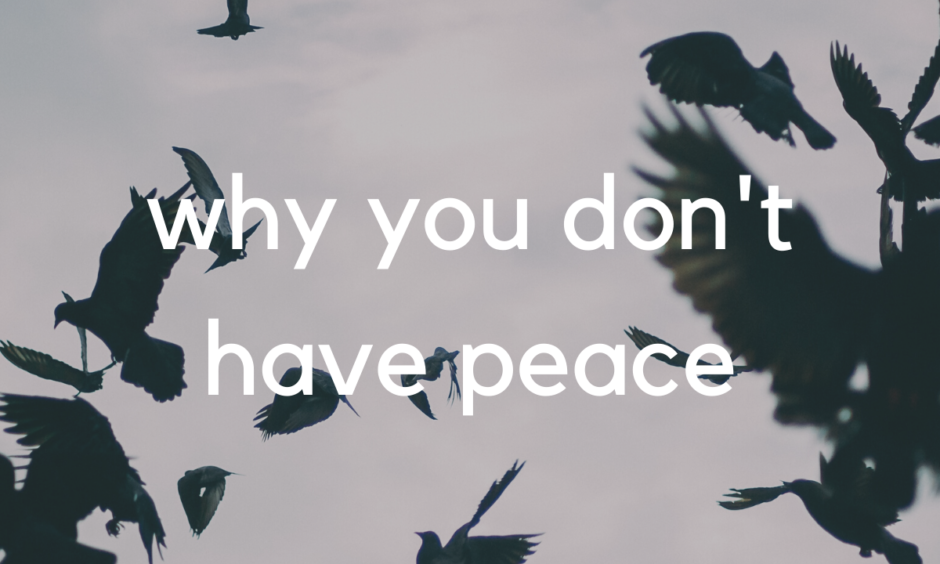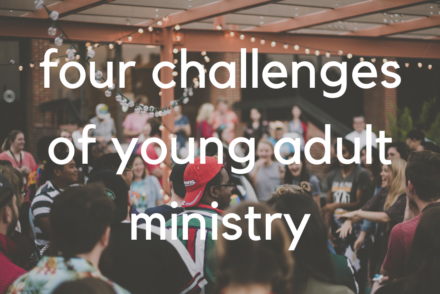We live in an age defined by anxiety and fear. From the political diatribes encouraging fear on both sides of the aisle (fear the loss of American’s preeminent position in the world, fear immigrants and illegals / fear judgmental conservatives, fear capitalism and the end of the world by global warming), to fear-fueled marketing tactics, we are surrounded by people selling fear and anxiety to us.
And it’s not just a thing of “the world.” I have multiple conversations each week with Christians who simply feel overwhelmed, at a loss, anxious, and barely able to handle their day-to-day life.
How have we come to this place? Where is the peace that Jesus promised when he told his followers, “ Peace I leave with you; my peace I give you. I do not give to you as the world gives. Do not let your hearts be troubled and do not be afraid” (John 14:27)? It seems like, for many, that peace is at best a distant hope.
Psalm 46 gives us a picture of what it looks like to trust God in a way that cultivates that kind of peace. Let’s learn from it.
God is our refuge and strength,
a very present help in trouble.
Therefore we will not fear though the earth gives way,
though the mountains be moved into the heart of the sea,
though its waters roar and foam,
though the mountains tremble at its swelling.
There is a river whose streams make glad the city of God,
the holy habitation of the Most High.
God is in the midst of her; she shall not be moved;
God will help her when morning dawns.
The nations rage, the kingdoms totter;
he utters his voice, the earth melts.
The Lord of hosts is with us;
the God of Jacob is our fortress. Selah
Come, behold the works of the Lord,
how he has brought desolations on the earth.
He makes wars cease to the end of the earth;
he breaks the bow and shatters the spear;
he burns the chariots with fire.
“Be still, and know that I am God.
I will be exalted among the nations,
I will be exalted in the earth!”
The Lord of hosts is with us;
the God of Jacob is our fortress.
- Psalm 46
The Psalmist makes the powerful declaration that God’s people, “ will not fear though the earth gives way, though the mountains be moved into the heart of the sea” (v.2) How is it that they can be fearless despite the world collapsing around them? What the Psalmist says throughout the rest of the Psalm gives us insight into why we don’t have that kind of peace and fearlessness.
Why you don’t have peace
You don’t believe God is actually present
God is our refuge and strength,
a very present help in trouble.
More often than not we think of God as distant. He’s up there in heaven somewhere, looking down on the world. Oh sure, he’s omnipresent, but when it comes down to that really just means he knows about what’s going on everywhere at any given time and can be there real quick if he wants.
Note the Psalmist’s words. For him God is a very present help during times of trouble. If we want to have peace we need to discover the beautiful truth that God is literally surrounding and present with us in every moment. Heaven isn’t a place up there. It’s a realm that is just beyond our field of view. As Paul tells the Athenian philosophers, in God we “live and move and have our being.” God is, literally, always with you.
You don’t believe God is actually powerful
The nations rage, the kingdoms totter;
he utters his voice, the earth melts.
The Lord of hosts is with us;
the God of Jacob is our fortress. Selah
Modernity has neutered God of his power. We are uncomfortable with the image of a God who can do violence and still be good, whereas the peoples of biblical times would have laughed at a god that didn’t have the power to give or take life at a whim. We have decided that God’s grace and love must mean that he is also a cozy, cuddly heavenly father who we can snuggle up with.
While it is true that God is a loving and gentle father, he is also the one who uproots kingdoms, utterly dominates the demonic Gods of Egypt by putting to death the firstborn child of every Egyptian, and can shows up to remake the world and eliminate all evil with a mere word in the book of Revelation. “He utters his voice, the earth melts.”
In our eagerness to downplay the discomfort of those biblical truths we have walked ourselves into a view of God as functionally powerless, leaving us to solve all of our own problems. And, though we don’t often admit it, we know that’s something we’re not really capable of.
If you don’t believe God is really powerful, you won’t have peace.
You don’t have space to be still
“Be still, and know that I am God.
I will be exalted among the nations,
I will be exalted in the earth!”
How are we to come to know and believe the things about God that we are currently disconnected from? Verse 10 tells us; “Be still”. It is through the time spent in stillness and rest that we come to know that God is God.
This isn’t the only place where this idea of being still as being instrumental in coming to know God is communicated in Scripture. Even prior to the fall Adam and Eve apparently took time to walk with God in the cool of evening (Genesis 3). God himself implements a day of rest and stillness after creating. During the exodus from Egypt Moses declares to the Israelites that they needed only to be still and observe the hand of God at work to save them from the oncoming army of Pharaoh (Exodus 14:13). Jesus frequently makes it a practice of retreating to quiet places to pray (Luke 5:16). There are many more instances that can and have been pointed to.
Here’s the key thing to take away: stillness is essential for knowing who God actually is. To the extent that we don’t make space for stillness, engaging God’s word, and prayer, we will be limited in our knowing God. Stillness forces us to realize that we are not God – that we can’t solve our problems
The beautiful peace
Far from overwhelming us, the discovery that we aren’t God and that God actually is in power results in the beautiful restfulness of the confession, “The Lord of hosts is with us; the God of Jacob is our fortress.” That will free us to taste that supernatural peace that Jesus promised.
But note well, this isn’t a one-time thing. You can’t take five minutes of stillness and expect to resolve your anxiety. A couple days ago I saw the quote, “Your body isn’t Amazon Prime. You can’t get the results you want in two days or less.” On the wall of a chiropractor’s office. The same is true of your soul. Learning to live in peace isn’t a one-click order kind of thing. It’s an ongoing process of learning to rest and trust. But the process and the results that come with it are well worth the work.





No Comments